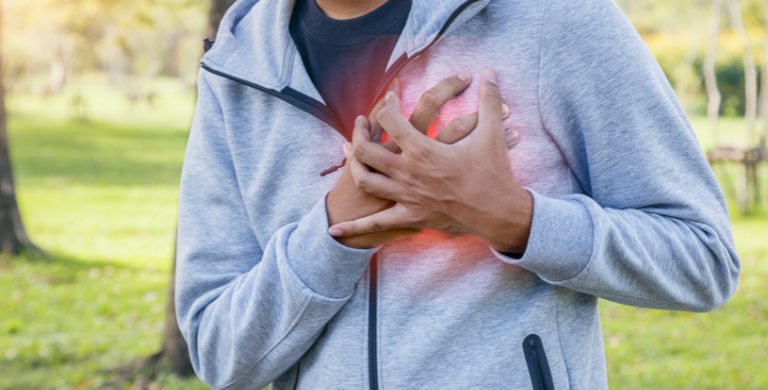What is the impact of an unhealthy heart?
An unhealthy heart significantly impacts your overall health. The most common heart disease is coronary artery disease (narrow or blocked coronary arteries), which can lead to chest pain, heart attacks, or stroke. Other heart diseases include congestive heart failure, heart rhythm problems, congenital heart disease (heart disease at birth), and endocarditis (inflamed inner layer of the heart), also called cardiovascular disease.

What causes heart disease?
Heart disease occurs when plaque develops in the arteries and blood vessels that lead to the heart. It blocks essential nutrients and oxygen from reaching the heart and can be caused by the following:
- Blood pressure
- Cigarette smoking
- Unhealthy diet
- Lack of exercise
- Obesity
- Elevated cholesterol or triglycerides
- Insulin resistance or diabetes
- Clinical depression
What are the symptoms of heart disease?
Heart problems do not always come with clear warning signs; however, the symptoms may include:
- Chest discomfort
- Shortness of breath
- Nausea, indigestion, heartburn, or stomach pain
- Pain that spreads to the arm
- Feeling dizzy or lightheaded
- Throat or jaw pain
- Fatigue
- Snoring
- Trouble sleeping
- Sweating
- Coughing
- Swollen legs, feet, and ankles
- Irregular heartbeat
What are the complications of heart disease?
Complications of heart disease include:
- Heart failure
- Heart attack
- Stroke
- Aneurysm
- Peripheral artery disease
- Sudden cardiac arrest
How can I monitor and maintain living with heart disease?
- Keep your blood pressure within a healthy range.
- Check for changes in your fluid status by weighing yourself daily and checking for swelling.
- Maintain fluid balance. The more liquid you carry in your blood vessels, the harder your heart must work to pump excess fluid through your body.
- Limit your salt (sodium) intake.
- Take your medications as prescribed.
When to consult a doctor
Consult your doctor if you think you are experiencing signs or symptoms of heart disease. Get emergency medical help if you have any of the following symptoms:
- Chest pain
- Fainting or severe weakness
- Rapid or irregular heartbeat with shortness of breath
- Coughing up white or pink, foamy mucus
Intercare is a family friendly healthcare company that combines state-of-the-art facilities with expert healthcare professionals, providing integrated healthcare 7 days a week to over 1 million patients per annum.
- Intercare Classic Road Race 2025: Run with your heart for your health28 Oct 11:04
- Intercare launches 'Greater than stroke: A journey to recovery' campaign25 Oct 11:59
- Intercare Day Hospitals co-payment discounts on medical and dental procedures11 Oct 15:02
- Intercare Group celebrates the success of the Intercare Blouberg Marathon and announces beneficiaries09 Sep 11:48
- A people-centred approach to honour inclusivity within Intercare Group16 Aug 13:46






